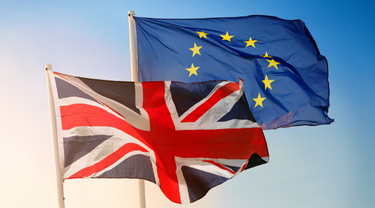
Canada-U.K. trade: A market full of export opportunities
In this article:
Canada and the United Kingdom (U.K.) have a deep and enduring relationship rooted in shared history, culture and strong economic ties. As members of the G7, G20 and the Commonwealth, our nations have built a strong trade partnership. This gives Canadian businesses access to significant export opportunities in one of the world’s most competitive and dynamic markets.
“As of 2025, the U.K. is Canada’s second-largest destination for total exports of goods and services, valued at $40.2 billion,” says Adam Murray, Export Development Canada’s (EDC) regional manager for Europe. “Put together, Scotland, England, Northern Ireland and Wales are a strong market for Canada’s goods and services across a diverse range of sectors, including energy, renewables, critical minerals, infrastructure and transportation, agri-food and advanced technologies.” EDC also has an office in London to support Canadian businesses in the U.K. market.
Canada-U.K. trade agreements

- The U.K. is Canada’s third-largest trading partner (imports and exports). Since 2016, trade in goods and services with the U.K. has increased 52.6% to $60.9 billion in 2024, first under the Canada-European Union Comprehensive Economic and Trade Agreement (CETA) and now under the Canada-U.K. Trade Continuity Agreement (TCA) after the U.K.’s departure from the European Union (EU).
- The TCA came into force on April 1, 2021. This agreement ensures continued preferential trade access into each other’s markets and the elimination of tariffs on 99% of Canadian exports to the U.K. The TCA doesn’t expire. Negotiations towards a new Canada-U.K. Free Trade Agreement (CUKFTA) started in 2022, but have since been paused. The pause doesn’t affect the TCA, which continues to be in force.
- The Comprehensive and Progressive Agreement for Trans-Pacific Partnership (CPTPP), a regional free trade agreement between 12 countries, has been in force for Canada since 2018. In December 2024, the U.K. joined the CPTPP.
However, Canada hasn’t officially ratified the U.K.’s accession to the CPTPP, so bilateral provisions between our countries are not yet active. The timing for Canada to finalize the agreement with the U.K. remains unknown.
Exporting to the U.K.: Trade opportunities await
The U.K. is very competitive for goods, services and R&D, particularly in cleantech and renewable energy, making doing business in the U.K. an attractive option. With a target of achieving net zero greenhouse gas (GHG) emissions by 2050, the government is prioritizing decarbonization through initiatives, like electric vehicles, clean energy production including nuclear energy production and renewable energy.
The government’s Road to Zero Strategy policy sets the goal of 50% to 70% of new car sales to be ultra-low emission by 2030, alongside 40% of new vans. The result? Investment in a range of low-carbon solutions, including offshore wind generation, advanced nuclear power, zero emission vehicles, green public transportation, carbon capture, utilization and storage (CCUS), and green finance.
Key areas of opportunity for exports
- Agri-food, particularly pulses and grains, plant-based proteins, maple syrup and seafood. There are also opportunities in private label products, or store brands, with several large retailers operating in the U.K. and Europe, providing a substantial market for Canadian exporters.
- Critical minerals supply chains, infrastructure and transportation, particularly electric vehicles and batteries.
- Advanced technologies and digital industries.
- Storage of renewable energy resources is a growth area in the U.K., as the country continues its expansion of wind and solar farms off the coast of Scotland. This industry is attractive for companies investing in renewables.
- The U.K. has taken the unique step to privatize its water and wastewater industries, resulting in increased overseas infrastructure investment opportunities, especially cleantech.
You should also check out
EDC interactive tool offers economic insights on Canada’s Top 75 trading partners.
Challenges to Canada-U.K. trade
The U.K. is one of the most dynamic and robust economies in the world, attracting billions of dollars in global trade annually. This makes it a highly competitive market for both local companies and international businesses.
- As a highly competitive economy, the U.K. favours R&D, innovation and advanced services, offering Canadian companies access to venture capital and investment.
- In alignment with the EU, the U.K. has stringent requirements for imported foods, especially poultry and beef. Canadian exporters should seek certification and guidance on labelling, inspection and content standards.
- Retail products face certification requirements to be on shelves, but mainly for branded items, Murray says. Private label products, a strength of Canada, often have fewer certification demands.
U.K. market entry
Setting up a local presence or partnering with local representatives can be beneficial. A local distribution partner can manage logistics, while a U.K. business development representative can build relationships and drive sales. Local marketing agencies can tailor strategies for British audiences, and U.K.-based law firms can navigate legal and regulatory requirements.
Explore more information about exporting to the U.K. on our U.K. country and market information page, or contact one of our export advisors through EDC’s Export Help Hub.
· Short-term risk rating: Low
· Top Canadian exports to the U.K. (2024): Metal and non-metallic mineral products, commercial services, energy products, aircraft and transportation equipment and parts, consumer goods, farm/fishing and intermediate food products
· Total value of Canadian exports to the U.K. (2024): $29.6 billion
· Canada-U.K. trade agreement: Canada-U.K. Trade Continuity Agreement
· U.K. population (2023): 68.3 million
You should also check out
How Canadian exporters can reduce trade risks and successfully enter high-growth European markets.

















